Ad
PHP Unit 3 functions_in_php_2
- 1. UNIT – 3 FUNCTIONS IN PHP Dr. P S V S Sridhar Assistant Professor (SS) Centre for Information Technology | Jan 2013| © 2012 UPES
- 2. Functions A function is a self-contained block of statements that performs a specific task . Functions are most useful when you need to use the same code in more than one place. Reusing existing code reduces costs, increases reliability, and improves consistency. Ideally, combining existing reusable components, with a minimum of development from scratch creates a new project. If you find that your code files are getting longer, harder to understand, and more difficult to manage, however, it may be an indication that you should start wrapping some of your code up into functions. Some of the properties of a function: has a unique name. is independent and it can perform its task without intervention from or interfering with other parts of the program . can take some inputs(i.e arguments) for performing a task. returns a value to the calling program. This is optional and depends upon the task your function is going to accomplish. Jul 2012 Jan 2013 © 2012 UPES
- 3. Functions Functions are the heart of a well-organized script, making code easy to read and reuse. The basic syntax for using (or calling) a function is: function_name(expression_1, expression_2, ..., expression_n) sqrt(9); // square root function, evaluates to 3 rand(10, 10 + 10); // random number between 10 and 20 strlen(“This has 22 characters”); // returns the number 22 pi(); // returns the approximate value of pi strrev (" .dlrow olleH"); //returns Hellow world. str_repeat("Hip ", 2); //returns Hip two times strtoupper("hooray!"); //returns in capital HOORAY phpinfo() function prints out the internal configuration capabilities of your particular PHP installation Jul 2012 Jan 2013 © 2012 UPES
- 4. Built-in Functions in PHP Every language has a set of built-in functions (for example, string functions). For example: echo(“PHP”); print(“It is a server side programming language”); Some of the Array functions in PHP are: array() ◦ To Create an array sort() ◦ Sorts an array array_unique() ◦ Removes duplicate values from an array count() ◦ Counts no of elements in an array array_reverse() ◦ Returns an array in the reverse order Jul 2012 Jan 2013 © 2012 UPES
- 5. Built-in Functions in PHP Some of the character functions in PHP are: ctype_upper() ◦ Checks if all of the characters in the provided string are uppercase characters, return as 1. ctype_digit() ◦ Checks if all of the characters in the provided string, text, are numerical. ctype_alpha() ◦ Checks if all of the characters in the provided string, text, are alphabetic ctype_alnum() - Check for alphanumeric character(s) ctype_xdigit() - Check for character(s) representing a hexadecimal digit is_numeric() - Finds whether a variable is a number or a numeric string is_int() - Find whether the type of a variable is integer is_string() - Find whether the type of a variable is string Jul 2012 Jan 2013 © 2012 UPES
- 6. User defined functions A function is a way of wrapping up a chunk of code and giving that chunk a name, so that you can use that chunk later in just one line of code. Functions are most useful when you will be using the code in more than one place, but they can be helpful even in one-use situations, because they can make your code much more readable. function function-name ($argument-1, $argument-2, ..) { statement-1; statement-2; ... } That is, function definitions have four parts: The special word function The name that you want to give your function The function’s parameter list — dollar-sign variables separated by commas The function body — a brace-enclosed set of statements Jul 2012 Jan 2013 © 2012 UPES
- 7. Function definition example function better_deal ($amount_1, $price_1,$amount_2, $price_2) { $per_amount_1 = $price_1 / $amount_1; $per_amount_2 = $price_2 / $amount_2; return($per_amount_1 < $per_amount_2); } $liters_1 = 1.0; $price_1 = 1.59; $liters_2 = 1.5; $price_2 = 2.09; if (better_deal($liters_1, $price_1, $liters_2, $price_2)) print(“The first deal is better!<BR>”); else print(“The second deal is better!<BR>”); Jul 2012 Jan 2013 © 2012 UPES
- 8. Call by Value The argument variable within the function is an "alias" to the actual variable But even further, the alias is to a *copy* of the actual variable in the function call function double($alias) { $alias = $alias * 2; return $alias;} $val = 10; $dval = double($val); echo "Value = $val Doubled = $dvaln"; Output: Value = 10 Doubled = 20 Jul 2012 Jan 2013 © 2012 UPES
- 9. Call by Reference Sometimes we want a function to change one of its arguments - so we indicate that an argument is "by reference" using ( & ) function triple(&$alias) { $alias = $alias * 3;} $val = 10; triple($val); echo "Triple = $valn"; Output: Triple = 30 Jul 2012 Jan 2013 © 2012 UPES
- 10. Argument number mismatches Too few arguments If you supply fewer actual parameters than formal parameters, PHP will treat the unfilled formal parameters as if they were unbound variables. However, under the usual settings for error reporting in PHP6, you will also see a warning printed to the browser. Too many arguments If you hand too many arguments to a function, the excess arguments will simply be ignored, even when error reporting is set to E_ALL. Jul 2012 Jan 2013 © 2012 UPES
- 11. Passing Arrays to Functions <?php $scores = array(57,58,39,67,59); average($scores); function average($array) { $t = 0; foreach($array as $val) $t = $t + $val; if(count($array > 0)) echo "The average is ", $t/count($array); else echo "No elements to average"; } ?> Jul 2012 Jan 2013 © 2012 UPES
- 12. Returning Arrays <?php $data1 = create_array(3); print_r($data1); $data2 = create_array(4); print_r($data2); function create_array($number) { for($counter = 0; $counter < $number; $counter++) { $array[] = $counter; } return $array; } ?> Jul 2012 Jan 2013 © 2012 UPES
- 13. PHP Variable Scopes The scope of a variable is the part of the script where the variable can be referenced/used. PHP has four different variable scopes: local global static parameter Jul 2012 Jan 2013 © 2012 UPES
- 14. Functions and variable scope The scope of a variable defined inside a function is local by default, meaning that it has no connection with the meaning of any variables outside the function. The syntax of this declaration is simply the word global, followed by a comma-delimited list of the variables that should be treated that way, with a terminating semicolon. Ex2: <?php global $count1, $count2; $x=5; // global scope Ex1: $y=10; // global scope <?php function myTest() function myfunction() { { global $x,$y; $GLOBALS["n1"] = 10; $y=$x+$y; } } $n1 = 20; myTest(); myfunction(); echo $y; // outputs 15 ?> echo $n1; Jul 2012 Jan 2013 © 2012 UPES
- 15. Static variables The static keyword allows for an initial assignment, which has an effect only if the function has not been called before. The first time the variable executes initial value assigned. The second time the function is called, it has the value it had at the end of the last execution. <?php function myTest() { static $x=0; echo $x; $x++; Output: } 012 myTest(); myTest(); myTest(); ?> Jul 2012 Jan 2013 © 2012 UPES
- 16. Example function SayMyABCs3 () { static $count = 0; //assignment only if first time called $limit = $count + 10; while ($count < $limit) { print(chr(ord(‘A’) + $count)); // chr () converts ASCII to char ord() returns ASCII value of char $count = $count + 1; Output: } ABCDEFGHIJ print(“<BR>Now I know $count letters<BR>”); Now I know 10 letters } Now I’ve made 1 function call(s). $count = 0; KLMNOPQRST SayMyABCs3(); Now I know 20 letters $count = $count + 1; Now I’ve made 2 function call(s). print(“Now I’ve made $count function call(s).<BR>”); SayMyABCs3(); $count = $count + 1; print(“Now I’ve made $count function call(s).<BR>”); Jul 2012 Jan 2013 © 2012 UPES
- 17. Parameter Scope A parameter is a local variable whose value is passed to the function by the calling code. Parameters are declared in a parameter list as part of the function declaration: <?php function myTest($x) { echo $x; } myTest(5); ?> Jul 2012 Jan 2013 © 2012 UPES
- 18. Include and require It’s very common to want to use the same set of functions across a set of web site pages, and the usual way to handle this is with either include or require, both of which import the contents of some other file into the file being executed. Using either one of these forms is vastly preferable to cloning your function definitions (that is, repeating them at the beginning of each page that uses them). For example, at the top of a PHP code file we might have lines like: include “basic-functions.inc”; include “advanced-function.inc”; Both include and require have the effect of splicing in the contents of their file into the PHP code at the point that they are called. The only difference between them is how they fail if the file cannot be found. The include construct will cause a warning to be printed, but processing of the script will continue; require, on the other hand, will cause a fatal error if the file cannot be found. Jul 2012 Jan 2013 © 2012 UPES
- 19. include "header.php"; - Pull the file in here include_once "header.php"; - Pull the file in here unless it has already been pulled in before require "header.php"; - Pull in the file here and die if it is missing require_once "header.php"; - You can guess what this means... These can look like functions - require_once("header.php"); Jul 2012 Jan 2013 © 2012 UPES
- 20. Missing functions Sometimes depending on the version or configuration of a particular PHP instance, some functions may be missing. We can check that. if (function_exists("array_combine")) { echo "Function exists";} else { echo "Function does not exist";} Jul 2012 Jan 2013 © 2012 UPES
- 21. Variable functions In PHP we can assign variable value as a function name. <?php $function_variable = "red"; $function_variable(); $function_variable = "white"; $function_variable("In white() now"); function red() { echo "In red() now"; } function white($argument) { echo $argument; } Jul 2012 Jan 2013 © 2012 UPES ?>
- 22. Nested functions <?php or <?php outer_function(); outer_function(); function outer_function() { inner_function(); echo "Outer function"; function outer_function() inner_function(); } { function inner_function() { echo "Outer function"; echo "inner function"; function inner_function() } ?> { echo "inner function"; } } ?> Jul 2012 Jan 2013 © 2012 UPES
- 23. Passing Variable Number of Arguments func_num_args – Returns the number of arguments passed func_get_arg – Returns a single argument func_get_args – Returns all arguments in an array <?php connector('How','are','things'); function connector() { $data = ''; $arguments = func_get_args(); for ($loop_index = 0; $loop_index <func_num_args(); $loop_index++) $data .= $arguments[$loop_index] . ' '; echo $data; output: } How are things ?> Jul 2012 © 2012 UPES Jan 2013
- 24. Jul 2012 Jan 2013 © 2012 UPES








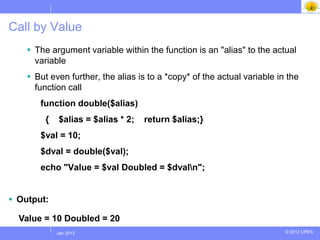
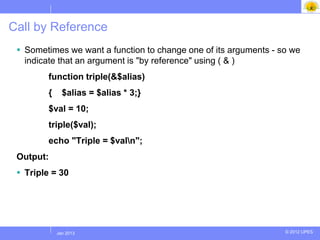


![Returning Arrays
<?php
$data1 = create_array(3);
print_r($data1);
$data2 = create_array(4);
print_r($data2);
function create_array($number)
{
for($counter = 0; $counter < $number; $counter++)
{ $array[] = $counter; }
return $array;
}
?>
Jul 2012
Jan 2013 © 2012 UPES](https://image.slidesharecdn.com/unit3functionsinphp2-130317124256-phpapp02/85/PHP-Unit-3-functions_in_php_2-12-320.jpg)

![Functions and variable scope
The scope of a variable defined inside a function is local by default,
meaning that it has no connection with the meaning of any variables
outside the function.
The syntax of this declaration is simply the word global, followed by a
comma-delimited list of the variables that should be treated that way, with
a terminating semicolon. Ex2:
<?php
global $count1, $count2; $x=5; // global scope
Ex1: $y=10; // global scope
<?php
function myTest()
function myfunction()
{
{ global $x,$y;
$GLOBALS["n1"] = 10; $y=$x+$y;
}
}
$n1 = 20; myTest();
myfunction(); echo $y; // outputs 15
?>
echo $n1;
Jul 2012
Jan 2013 © 2012 UPES](https://image.slidesharecdn.com/unit3functionsinphp2-130317124256-phpapp02/85/PHP-Unit-3-functions_in_php_2-14-320.jpg)
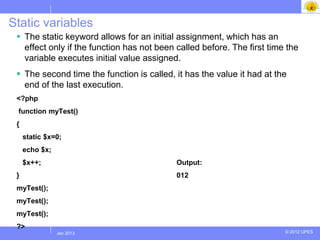



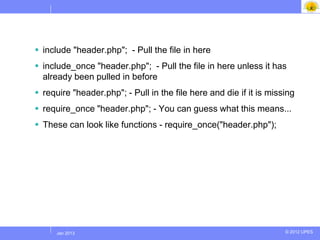


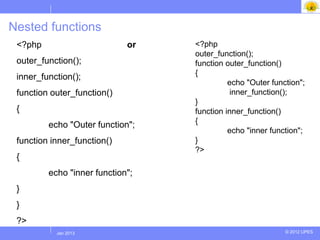
![Passing Variable Number of Arguments
func_num_args – Returns the number of arguments passed
func_get_arg – Returns a single argument
func_get_args – Returns all arguments in an array
<?php
connector('How','are','things');
function connector()
{
$data = '';
$arguments = func_get_args();
for ($loop_index = 0; $loop_index <func_num_args(); $loop_index++)
$data .= $arguments[$loop_index] . ' ';
echo $data; output:
} How are things
?> Jul 2012 © 2012 UPES
Jan 2013](https://image.slidesharecdn.com/unit3functionsinphp2-130317124256-phpapp02/85/PHP-Unit-3-functions_in_php_2-23-320.jpg)




































































